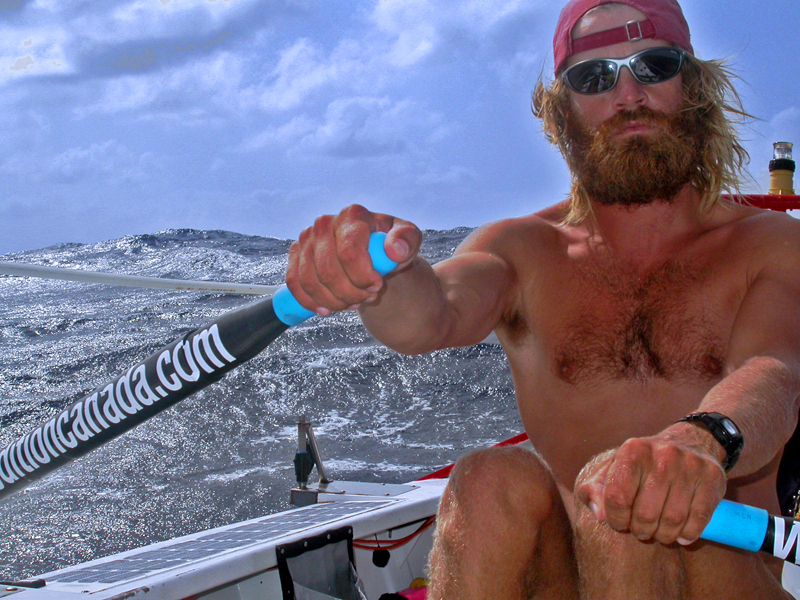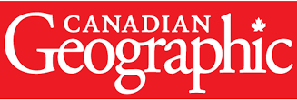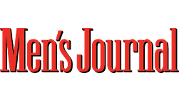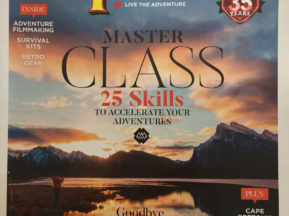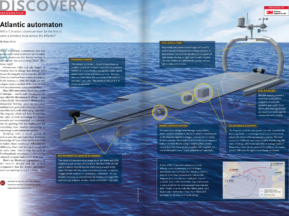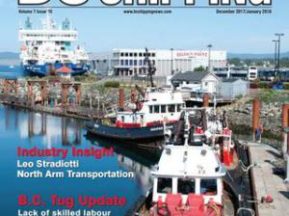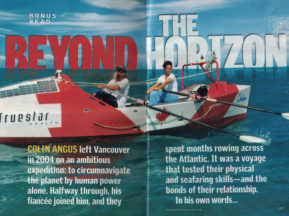Confessions of a Naked Rower
BC’s Colin Angus was first to circle the globe, muscle-powered.
B.C.’s Colin Angus was the first to make it around the world self-propelled. And oddly enough, his 720-day adventure started out on his computer.
Fascinated with travel since he was a child, and already an accomplished extreme adventurer with gutsy trips down the Yenisey and Amazon rivers under his belt, Angus did a Google search back in 2001 and realized nobody had ever humped it around the globe on human power alone. So he decided he’d try to be first.
His book, Beyond the Horizon, cheerfully yet carefully lays out how one thing led to another and how, by 2004, he and fellow Vancouver-based writer-explorer Tim Harvey set off for Siberia. For the next year, the pair cycled up B.C., canoed along the Yukon River to the tip of Alaska, rowed across the Bering Sea and proceeded, in the dead of winter, to bike, trek and ski across the 3,500 kilometers of frozen geography that lay between them and Moscow.
While Angus and Harvey planned to leverage their zero-emission travels to send a message about how individuals can combat global warming, tensions rose and the duo ended up in combat with each other. Beyond narrating the journey’s perils, yarns and cultural observations, Angus also offers his account of how the team’s relationship went south against a backdrop of cold, illness and flagging hopes in Russia’s far north.
Breaking with Harvey and joined by his fiancée Julie Wafaei in Moscow, Angus uses the second half of the book to talk about the second leg of his muscle-powered quest, and chronicles how the couple cycled Europe before taking up the oars in Lisbon and setting out across the Atlantic. Beset by multiple hurricanes, and rowing 18 to 20 hours a day, Angus and Wafaei made the 5,400 kilometre crossing to Costa Rica after 145 unsupported days at sea.
The three-month-long bike ride back to Vancouver — the 43,000 kilometre trek ends at the Kitsilano beach where it started — is a veritable cinch in comparison. Although convincing the people who edit his eponymous entry in Wikipedia and the folks at the Guinness World Records that his was a bona fide circumnavigation is proving to be another epic in and of itself, something he discusses in his interview with The Tyee (below).
Since being named the 2006 Adventurer of the Year (along with Wafaei) by National Geographic Adventure magazine, and hailed as one of 25 “bold visionaries with world-changing dreams” by Outside, Angus is currently enjoying what he calls his “biggest creature comfort” — the couple’s island country home in Courtenay, B.C.
He spoke to The Tyee about himself and his journey. Here is what he had to say…
On how a teen explorer rocked his world:
“What really changed my perception [about adventuring] was a book called Dove, about a young boy — I’m not sure that you would really call him an explorer but he was an adventurer — who sailed around the world at the age of sixteen.
“Dove was in the school curriculum. I read it and I found it so inspiring hearing about this young kid who had the dream, this big ambition, to go around the world in a boat.
“The thing that I liked about that book was that I had read of so many other expeditions that were about big groups and were heavily funded. To me, as just a little kid growing up in Port Alberni, a major expedition like that seemed impossible: you have to know the right people, you have to have the right connections. Whereas the journey that Robin Lee Graham did, just sort of going off on his own, seemed like something that anybody could do. So I found that quite inspiring and that’s what motivated me to do my first sailing trip across the Pacific Ocean.”
On his journey round the world versus Magellan’s in 1521:
“I think it’s easy to dismiss in this day and age just how tough things were back then. People say [to me] ‘It must have been tougher for you to go around the world by human power as opposed to Magellan, who had the sail.’
“But in reality I don’t think so, because now you have so many modern advantages in the way of technology, and the world’s a much more stable place. You don’t need to worry about a tribe of people attacking you when you step ashore, that sort of thing.”
On the assertion he’s therefore a wimp compared to Magellan:
“Exactly.”
On penning his falling-out with Tim Harvey:
“I tried to be as factual as I could. It was a part of the expedition that was very real and I couldn’t just sort of forget about it and conveniently leave it out. It was something that I spent a lot of time deciding what the best way to talk about would be.
“[Bad blood] is a pretty common theme in expeditioning. In so many of the books I’ve read — especially in long-distance expeditions — there are rifts in the team or at least major conflicts. As you can imagine, in a situation where you face all these life-and-death decisions and where you’re in each other’s faces all the time, cracks may start forming on the journey between you and people who you get along with just fine with in civilization. Unfortunately that’s what happened with Tim and me.”
On the attacks against him:
“You were just mentioning the Wikipedia page [where Angus’s self-powered circumnavigation is disputed] and it’s mainly Tim who looks after that, Tim and his friends. And he’s actually made a point of contacting Jason Lewis who has worked into a very convenient ally for him, because [Jason] is quite intent on undermining our expedition and the circumnavigation route and whatnot. So there have been some issues.”
On rival Jason Lewis:
“The reason why he’s contesting [my circumnavigation] is simply because obviously it’s advantageous for him to say he’s the first. That’s sort of the first and foremost [reason] as to why he’s doing this.
“Some of the things he’s saying are entirely incorrect. He says for example that we’re following the [circumnavigation] rules delineated for hot air balloons, which is absolutely incorrect. He states you need to reach antipodal requirements to do a circumnavigation, which again is absolutely incorrect.
“But the reason why he’s doing it up is because he’ll probably have a better chance at making some money or whatever it may be when he gets home if he can claim that he was the first to do it.”
On transatlantic rowing with your fiancée:
“When you’re in a row boat for 155 days you have to get along really well the other person. You can’t even go for a five-minute walk to get away from them.
“In all honesty, we never had one major argument all the way across.”
On rowing naked and fashioning fish-skin bikinis at sea:
“It’s definitely a different world. You lose any inhibitions you may have in civilization. You just kind of, yeah, do what you sort of do.”
On calmness in hurricane winds:
“In the Atlantic Ocean, when we were in our little row boat with hurricane winds [from Hurricanes Vince and Epsilon] coming straight towards us, that was another point when we were, I think, feeling pretty concerned about our lives.
“I mean, nobody has ever ridden out a hurricane in a rowboat before, and even though your boat is supposed to be very seaworthy and take a lot, just the idea of having a storm that can flatten an entire city coming at your boat is no fun.”
On braving the storms:
“We were just inside the cabin for three-and-a-half days, riding it out and getting slammed from one side to the other. It was kind of like being inside a barrel going over a never-ending staircase of waterfalls.”
On bliss:
“Being in the middle of the Atlantic Ocean…I mean some of the warmest memories I have of this trip are on days when there weren’t hurricanes in the Atlantic and the weather was actually the opposite — sunny — and we were making good progress at the oars and just getting to see all the different creatures that would follow us.”
On fish fan clubs:
“We had fish that would follow us for hundreds and sometimes thousands of kilometers across the ocean. Most of the fish were really tame so you could swim beside them.”
On the inner explorer in everyone:
“I think everybody to some extent has the desire to explore, and it may not be the geography of the world or different cultures, but rather just a yearning to find out about areas they’re passionate in: a gardener for example who wants to learn about the best fertilizers or the best seeds.
“It’s really important that you can assess what it is that you want to do and go out there and spend some time pursuing that passion. I see a lot of people who are unhappy to some extent because they are in fields or areas where they can’t go out and pursue their passions.
“For me, I think it was about staying true to the little boy in me that wanted to go out and do these expeditions and to explore the exotic and interesting places.”
On being first:
“Obviously it’s quite an intimidating prospect to head off and try circumnavigating the world. That’s why there’s so few people out there attempting to do it and nobody who had completed it.”
On human, not carbon, power:
“One of our big reasons for doing this is to promote just how efficient human-powered transportation really is. If you can make it all the way around the world you can get around your community on a bike and use it for your own chores.
“With us, for example, we don’t even own a car; we just have a bunch of bikes and a BOB trailer and it’s just amazing what you can load into the BOB trailer. On the occasions where we do need a car, then we just rent. So that’s one thing that I do hope people will take note of.
“But it’s not just a matter of helping the environment; it’s also [about] helping yourself. I think everybody would agree that if they took their bike to work or if they walked to work they would feel better when they’re there and they’d be happy that they did it in hindsight.”
Colin Angus will be in Vancouver to read from his book at Chapters (788 Robson Street) on April 12 at 7 p.m. Admission is free.
Read this article on the Tyee website.


